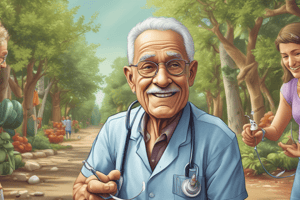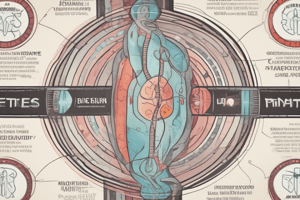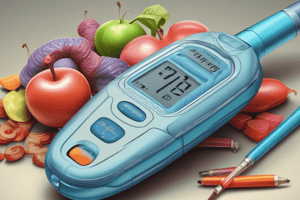Podcast
Questions and Answers
What is a primary focus in the nursing care of a patient with type 1 diabetes?
What is a primary focus in the nursing care of a patient with type 1 diabetes?
- Insulin administration and blood glucose monitoring (correct)
- Diet and exercise management only
- Oral medication administration
- Monitoring for hypertension
Which type of diabetes is often managed initially through lifestyle modifications such as diet and exercise?
Which type of diabetes is often managed initially through lifestyle modifications such as diet and exercise?
- Gestational diabetes
- Type 1 diabetes
- Insipidus diabetes
- Type 2 diabetes (correct)
In type 1 diabetes, what is a critical aspect of patient education?
In type 1 diabetes, what is a critical aspect of patient education?
- Proper foot care techniques
- Strategies for weight loss through diet
- Techniques for administering insulin and managing hypoglycemia (correct)
- Methods for monitoring blood pressure at home
Which of the following is a common comorbidity that nurses should monitor for in patients with type 2 diabetes?
Which of the following is a common comorbidity that nurses should monitor for in patients with type 2 diabetes?
What is a key difference in the etiology of type 1 diabetes compared to type 2 diabetes?
What is a key difference in the etiology of type 1 diabetes compared to type 2 diabetes?
Which of the following self-management skills is most crucial for a newly diagnosed patient with type 1 diabetes?
Which of the following self-management skills is most crucial for a newly diagnosed patient with type 1 diabetes?
What should a nurse prioritize when educating a patient with type 2 diabetes about exercise?
What should a nurse prioritize when educating a patient with type 2 diabetes about exercise?
Which laboratory value is most important for assessing long-term glycemic control in both type 1 and type 2 diabetes?
Which laboratory value is most important for assessing long-term glycemic control in both type 1 and type 2 diabetes?
In a patient with type 1 diabetes experiencing hyperglycemia, what immediate nursing intervention is most appropriate?
In a patient with type 1 diabetes experiencing hyperglycemia, what immediate nursing intervention is most appropriate?
Which of the following is a primary goal of nutritional counseling for patients with type 2 diabetes?
Which of the following is a primary goal of nutritional counseling for patients with type 2 diabetes?
What is the most common early symptom of hyperglycemia that a nurse should educate patients with diabetes to recognize?
What is the most common early symptom of hyperglycemia that a nurse should educate patients with diabetes to recognize?
For patients with type 2 diabetes, what benefit does regular physical activity provide beyond weight management?
For patients with type 2 diabetes, what benefit does regular physical activity provide beyond weight management?
What is the primary nursing concern regarding foot care education for diabetic patients?
What is the primary nursing concern regarding foot care education for diabetic patients?
Which of the following actions is essential for a nurse to perform when a patient with diabetes is admitted to the hospital?
Which of the following actions is essential for a nurse to perform when a patient with diabetes is admitted to the hospital?
What education should the nurse provide regarding alcohol consumption for a patient with diabetes?
What education should the nurse provide regarding alcohol consumption for a patient with diabetes?
A patient with type 1 diabetes plans to exercise. What should the nurse advise regarding insulin dosage?
A patient with type 1 diabetes plans to exercise. What should the nurse advise regarding insulin dosage?
What is a key aspect of managing sick days for a patient with diabetes?
What is a key aspect of managing sick days for a patient with diabetes?
Which of the following is an important teaching point for a patient starting on insulin therapy for either type 1 or type 2 diabetes?
Which of the following is an important teaching point for a patient starting on insulin therapy for either type 1 or type 2 diabetes?
What is a primary concern for nurses administering oral hypoglycemic agents to patients with type 2 diabetes?
What is a primary concern for nurses administering oral hypoglycemic agents to patients with type 2 diabetes?
Which statement best describes the role of the nurse in managing diabetes?
Which statement best describes the role of the nurse in managing diabetes?
Flashcards
Type 1 vs. Type 2 Diabetes
Type 1 vs. Type 2 Diabetes
Type 1 diabetes is an autoimmune condition where the body does not produce insulin. Type 2 diabetes is a metabolic disorder where the body does not respond normally to insulin.
Insulin in Type 1 Diabetes
Insulin in Type 1 Diabetes
Involves insulin administration (injection or pump) because the body doesn't produce it.
Treatment for Type 2 Diabetes
Treatment for Type 2 Diabetes
May include lifestyle changes (diet and exercise), oral medications, and/or insulin, depending on the individual's needs.
DKA Risk: Type 1 Diabetes
DKA Risk: Type 1 Diabetes
Signup and view all the flashcards
HHS Risk: Type 2 Diabetes
HHS Risk: Type 2 Diabetes
Signup and view all the flashcards
Type 1 Diabetes: Nursing Care
Type 1 Diabetes: Nursing Care
Signup and view all the flashcards
Type 2 Diabetes: Nursing Care
Type 2 Diabetes: Nursing Care
Signup and view all the flashcards
Type 1: Patient Education Topics
Type 1: Patient Education Topics
Signup and view all the flashcards
Type 2: Patient Education Topics
Type 2: Patient Education Topics
Signup and view all the flashcards
Type 1: Monitoring Complications
Type 1: Monitoring Complications
Signup and view all the flashcards
Type 2: Monitoring Complications
Type 2: Monitoring Complications
Signup and view all the flashcards
Study Notes
- Nursing care for both type 1 and type 2 diabetes involves patient education, medication management, blood glucose monitoring, and lifestyle counseling.
- The specific nursing interventions may differ based on the type of diabetes, the patient's treatment plan, and individual needs.
Type 1 Diabetes
- Type 1 diabetes is an autoimmune condition where the body does not produce insulin.
- Requires lifelong insulin therapy for survival.
- Nursing care focuses on educating patients and families on insulin administration, blood glucose monitoring, and hypoglycemia/hyperglycemia management.
- Education includes different types of insulin (rapid-acting, short-acting, intermediate-acting, long-acting), injection techniques, and insulin pump management if applicable.
- Teach patients how to match insulin doses to carbohydrate intake, activity levels, and blood glucose readings through carbohydrate counting or other methods.
- Stress the importance of regular blood glucose monitoring (usually multiple times a day) to guide insulin dosing and detect trends.
- Educate on the signs and symptoms of hypoglycemia (low blood sugar) and hyperglycemia (high blood sugar).
- Provide guidance on how to treat hypoglycemia with fast-acting carbohydrates (e.g., glucose tablets, juice) and when to seek emergency care.
- Explain how to adjust insulin doses during illness or exercise.
- Regular physical activity is important, but patients need to understand how exercise affects blood glucose levels and adjust insulin or carbohydrate intake accordingly.
- Dietary education focuses on balanced meals and consistent carbohydrate intake to match insulin doses.
- Monitor for complications such as diabetic ketoacidosis (DKA), especially during illness or insulin pump malfunction.
- Psychological support and counseling may be needed to address the challenges of living with type 1 diabetes.
- Regular follow-up with endocrinologist and diabetes educator is crucial for optimal management.
Type 2 Diabetes
- Type 2 diabetes is characterized by insulin resistance and progressive decline in insulin secretion.
- Management includes lifestyle modifications (diet and exercise), oral medications, and/or insulin therapy.
- Nursing care emphasizes education on healthy eating habits, weight management, and regular physical activity.
- Dietary education focuses on portion control, reducing intake of sugary beverages and processed foods, and increasing fiber intake.
- Encourage at least 150 minutes of moderate-intensity or 75 minutes of vigorous-intensity aerobic activity per week, along with strength training exercises.
- Educate patients about oral medications, including their mechanism of action, side effects, and proper administration.
- Common oral medications include metformin, sulfonylureas, DPP-4 inhibitors, SGLT2 inhibitors, and others.
- Some patients with type 2 diabetes may eventually require insulin therapy to achieve glycemic control.
- If insulin is prescribed, educate patients on insulin injection techniques, blood glucose monitoring, and hypoglycemia/hyperglycemia management, similar to type 1 diabetes education.
- Regular blood glucose monitoring may be recommended, especially for those on insulin or sulfonylureas.
- Teach patients the signs and symptoms of hyperglycemia and hypoglycemia, and how to manage them.
- Monitor for complications such as hyperglycemic hyperosmolar state (HHS), especially in older adults.
- Provide education on foot care, eye care, and cardiovascular risk reduction.
- Encourage annual eye exams and foot exams to detect early signs of complications.
- Counsel on smoking cessation, blood pressure control, and cholesterol management to reduce cardiovascular risk.
- Regular follow-up with primary care physician and diabetes educator is essential for ongoing management and support.
Similarities in Nursing Care
- Both type 1 and type 2 diabetes require ongoing education and support to promote self-management.
- Blood glucose monitoring is a critical component of care for both types of diabetes.
- Education on hypoglycemia and hyperglycemia recognition and treatment is essential.
- Lifestyle counseling, including dietary guidance and exercise recommendations, is important for both.
- Monitoring for complications and providing preventive care are crucial in both types of diabetes.
- Psychosocial support and addressing emotional well-being are important for all patients with diabetes.
- Collaboration with a multidisciplinary team, including physicians, diabetes educators, dietitians, and other healthcare professionals, is essential for comprehensive care.
Differences in Nursing Focus
- Type 1 diabetes nursing primarily focuses on insulin management and matching insulin doses to carbohydrate intake and activity levels.
- Type 2 diabetes nursing emphasizes lifestyle modifications, weight management, and education on oral medications, with insulin therapy as a possible addition.
- DKA is more common in type 1 diabetes, while HHS is more common in type 2 diabetes; nursing care should be tailored accordingly.
- Type 2 diabetes often involves managing other comorbidities such as hypertension, hyperlipidemia, and cardiovascular disease, requiring a broader focus in nursing care.
- Patient education needs to be individualized based on the patient's diabetes type, treatment plan, and self-management abilities.
- Cultural sensitivity and addressing socioeconomic factors are important considerations in diabetes education and management for all patients.
- Nurses should empower patients to actively participate in their own care and make informed decisions about their health.
Studying That Suits You
Use AI to generate personalized quizzes and flashcards to suit your learning preferences.




